Social Policy: Annotated Bibliography on Isolation in Old Age
VerifiedAdded on 2023/06/04
|8
|1796
|130
Annotated Bibliography
AI Summary
This annotated bibliography examines the critical issues of social isolation and loneliness among older adults and the social policies and interventions designed to address these challenges. The reviewed papers explore various dimensions of interventions, including technology-based solutions, group reminiscence therapy, and mindfulness techniques, aimed at reducing social isolation and improving the well-being of the elderly. Studies highlight the negative impacts of social isolation on cognitive and physical health, emphasizing the importance of social interaction and community resources. The bibliography also addresses ethical considerations in implementing technology-driven interventions and the role of social networking sites in fostering social connections for older adults. The research suggests that multifaceted approaches, tailored to individual needs and leveraging technology, hold promise for mitigating social isolation and enhancing the quality of life for the aging population.
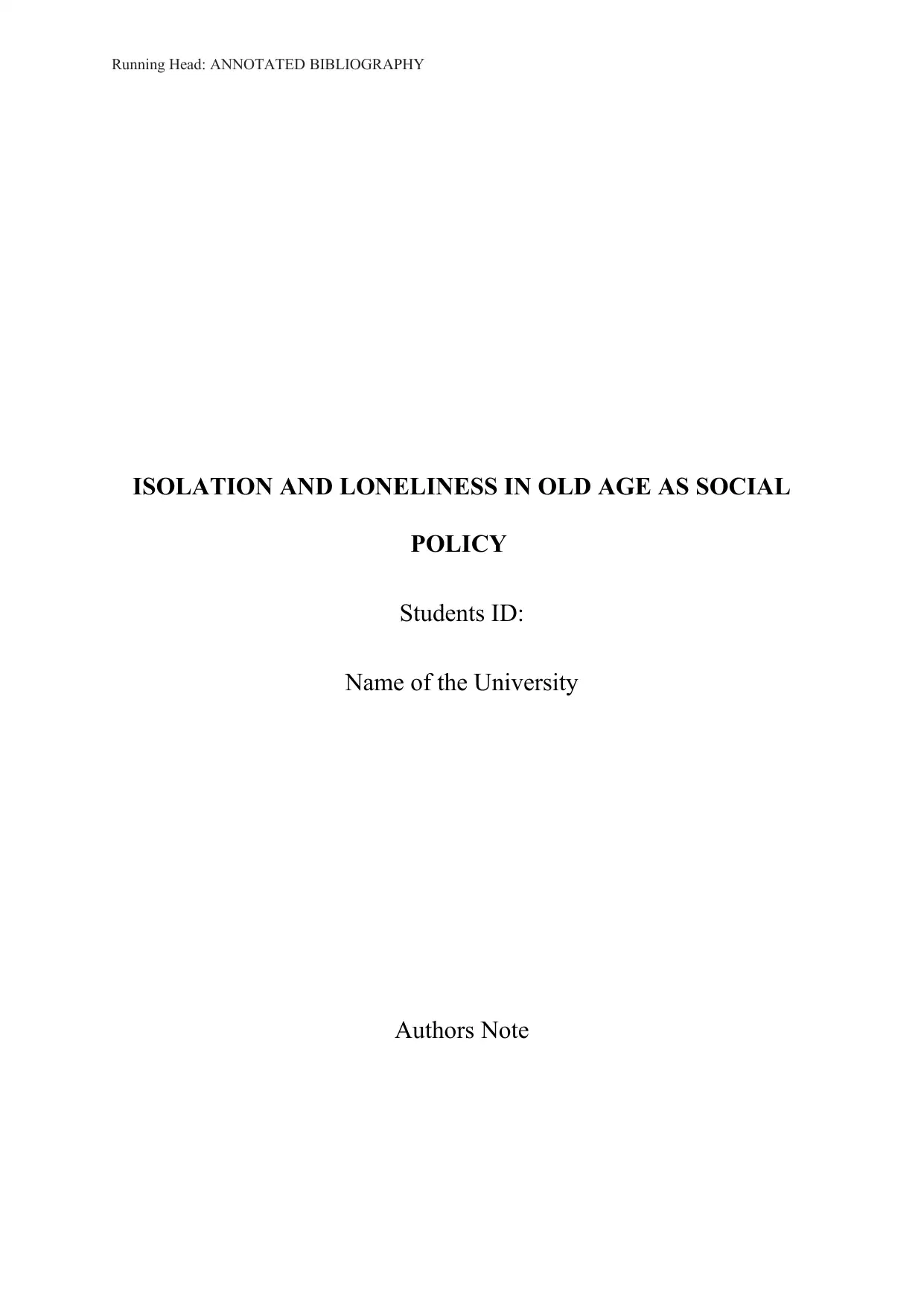
Running Head: ANNOTATED BIBLIOGRAPHY
ISOLATION AND LONELINESS IN OLD AGE AS SOCIAL
POLICY
Students ID:
Name of the University
Authors Note
ISOLATION AND LONELINESS IN OLD AGE AS SOCIAL
POLICY
Students ID:
Name of the University
Authors Note
Paraphrase This Document
Need a fresh take? Get an instant paraphrase of this document with our AI Paraphraser
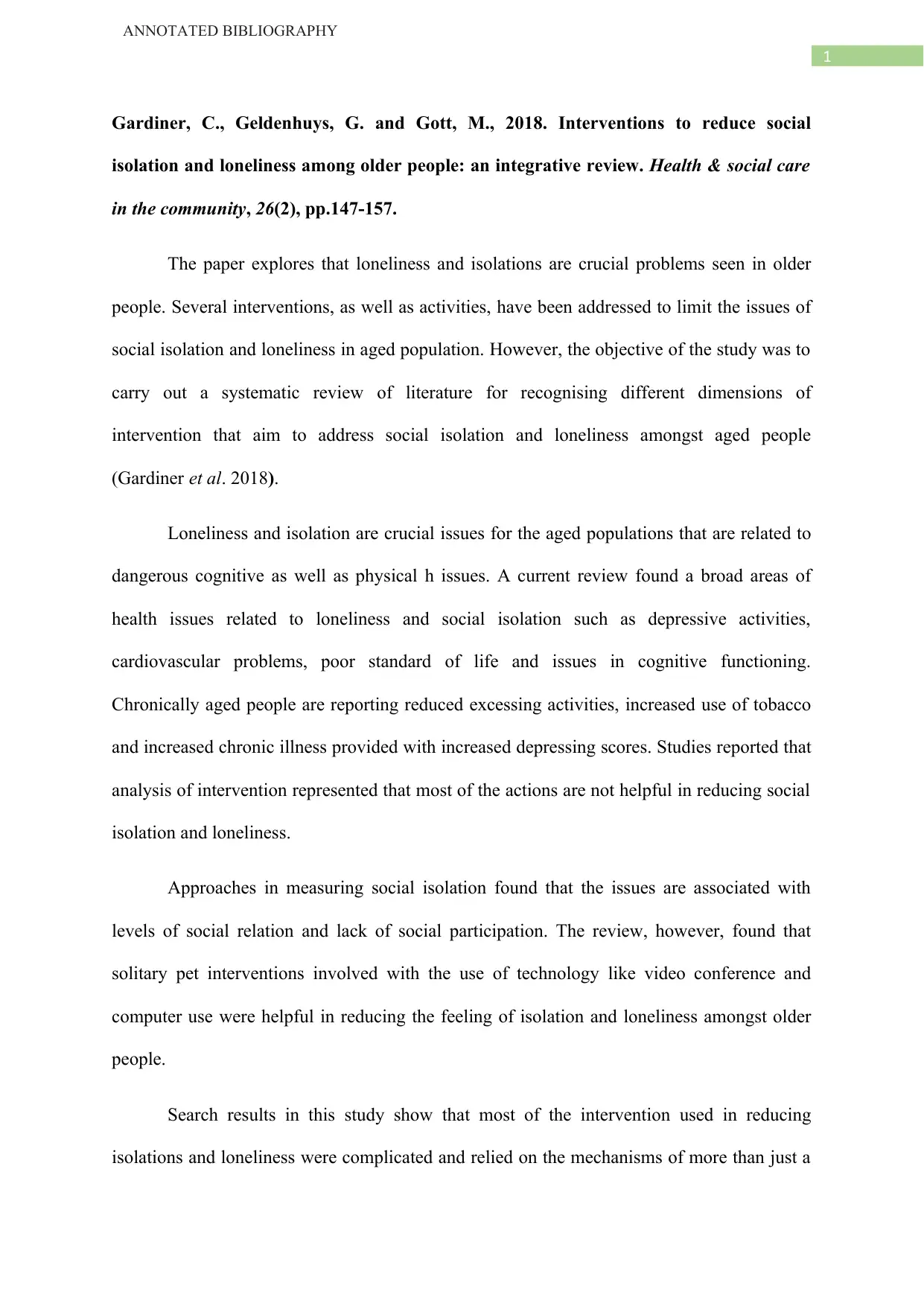
1
ANNOTATED BIBLIOGRAPHY
Gardiner, C., Geldenhuys, G. and Gott, M., 2018. Interventions to reduce social
isolation and loneliness among older people: an integrative review. Health & social care
in the community, 26(2), pp.147-157.
The paper explores that loneliness and isolations are crucial problems seen in older
people. Several interventions, as well as activities, have been addressed to limit the issues of
social isolation and loneliness in aged population. However, the objective of the study was to
carry out a systematic review of literature for recognising different dimensions of
intervention that aim to address social isolation and loneliness amongst aged people
(Gardiner et al. 2018).
Loneliness and isolation are crucial issues for the aged populations that are related to
dangerous cognitive as well as physical h issues. A current review found a broad areas of
health issues related to loneliness and social isolation such as depressive activities,
cardiovascular problems, poor standard of life and issues in cognitive functioning.
Chronically aged people are reporting reduced excessing activities, increased use of tobacco
and increased chronic illness provided with increased depressing scores. Studies reported that
analysis of intervention represented that most of the actions are not helpful in reducing social
isolation and loneliness.
Approaches in measuring social isolation found that the issues are associated with
levels of social relation and lack of social participation. The review, however, found that
solitary pet interventions involved with the use of technology like video conference and
computer use were helpful in reducing the feeling of isolation and loneliness amongst older
people.
Search results in this study show that most of the intervention used in reducing
isolations and loneliness were complicated and relied on the mechanisms of more than just a
ANNOTATED BIBLIOGRAPHY
Gardiner, C., Geldenhuys, G. and Gott, M., 2018. Interventions to reduce social
isolation and loneliness among older people: an integrative review. Health & social care
in the community, 26(2), pp.147-157.
The paper explores that loneliness and isolations are crucial problems seen in older
people. Several interventions, as well as activities, have been addressed to limit the issues of
social isolation and loneliness in aged population. However, the objective of the study was to
carry out a systematic review of literature for recognising different dimensions of
intervention that aim to address social isolation and loneliness amongst aged people
(Gardiner et al. 2018).
Loneliness and isolation are crucial issues for the aged populations that are related to
dangerous cognitive as well as physical h issues. A current review found a broad areas of
health issues related to loneliness and social isolation such as depressive activities,
cardiovascular problems, poor standard of life and issues in cognitive functioning.
Chronically aged people are reporting reduced excessing activities, increased use of tobacco
and increased chronic illness provided with increased depressing scores. Studies reported that
analysis of intervention represented that most of the actions are not helpful in reducing social
isolation and loneliness.
Approaches in measuring social isolation found that the issues are associated with
levels of social relation and lack of social participation. The review, however, found that
solitary pet interventions involved with the use of technology like video conference and
computer use were helpful in reducing the feeling of isolation and loneliness amongst older
people.
Search results in this study show that most of the intervention used in reducing
isolations and loneliness were complicated and relied on the mechanisms of more than just a
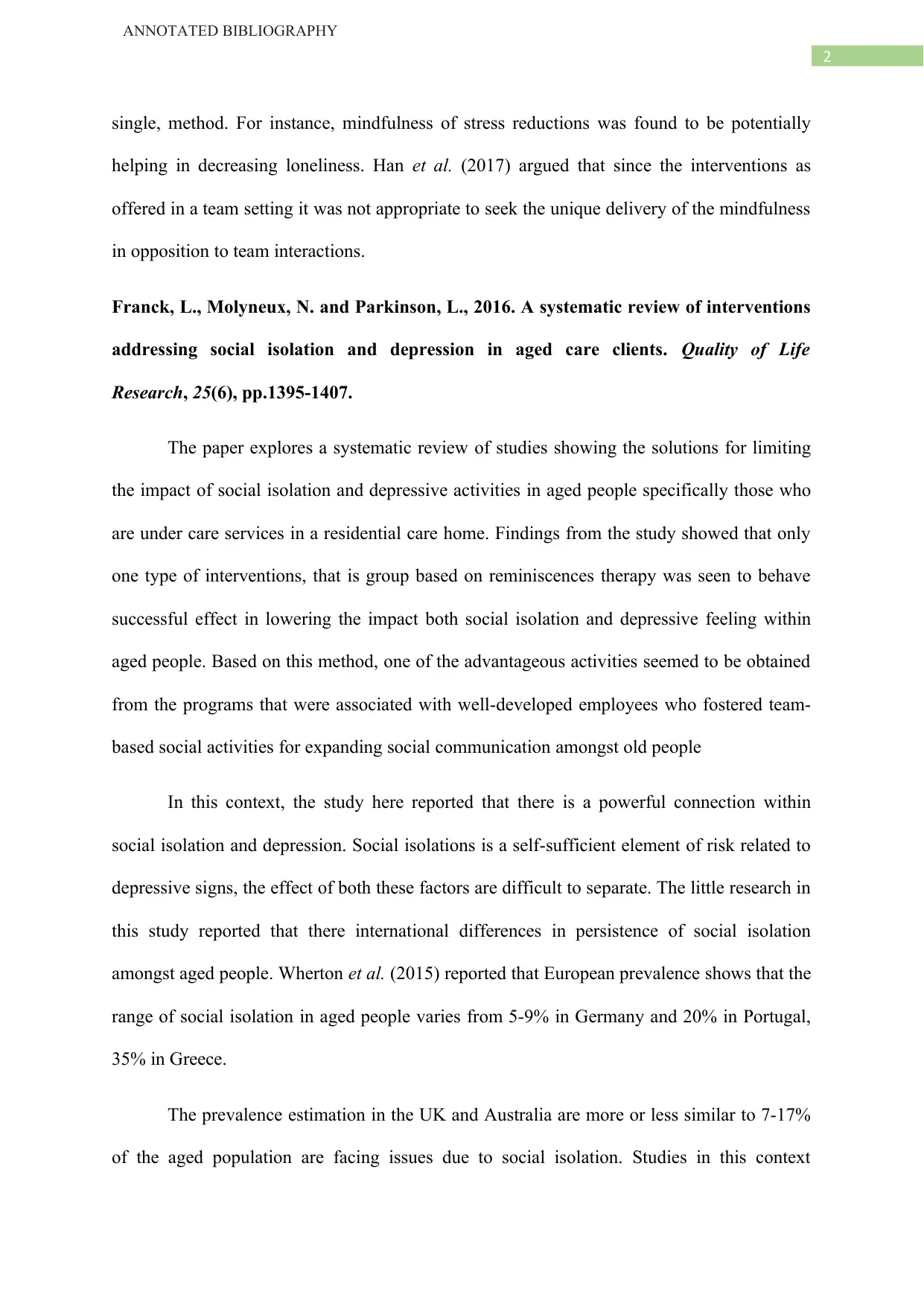
2
ANNOTATED BIBLIOGRAPHY
single, method. For instance, mindfulness of stress reductions was found to be potentially
helping in decreasing loneliness. Han et al. (2017) argued that since the interventions as
offered in a team setting it was not appropriate to seek the unique delivery of the mindfulness
in opposition to team interactions.
Franck, L., Molyneux, N. and Parkinson, L., 2016. A systematic review of interventions
addressing social isolation and depression in aged care clients. Quality of Life
Research, 25(6), pp.1395-1407.
The paper explores a systematic review of studies showing the solutions for limiting
the impact of social isolation and depressive activities in aged people specifically those who
are under care services in a residential care home. Findings from the study showed that only
one type of interventions, that is group based on reminiscences therapy was seen to behave
successful effect in lowering the impact both social isolation and depressive feeling within
aged people. Based on this method, one of the advantageous activities seemed to be obtained
from the programs that were associated with well-developed employees who fostered team-
based social activities for expanding social communication amongst old people
In this context, the study here reported that there is a powerful connection within
social isolation and depression. Social isolations is a self-sufficient element of risk related to
depressive signs, the effect of both these factors are difficult to separate. The little research in
this study reported that there international differences in persistence of social isolation
amongst aged people. Wherton et al. (2015) reported that European prevalence shows that the
range of social isolation in aged people varies from 5-9% in Germany and 20% in Portugal,
35% in Greece.
The prevalence estimation in the UK and Australia are more or less similar to 7-17%
of the aged population are facing issues due to social isolation. Studies in this context
ANNOTATED BIBLIOGRAPHY
single, method. For instance, mindfulness of stress reductions was found to be potentially
helping in decreasing loneliness. Han et al. (2017) argued that since the interventions as
offered in a team setting it was not appropriate to seek the unique delivery of the mindfulness
in opposition to team interactions.
Franck, L., Molyneux, N. and Parkinson, L., 2016. A systematic review of interventions
addressing social isolation and depression in aged care clients. Quality of Life
Research, 25(6), pp.1395-1407.
The paper explores a systematic review of studies showing the solutions for limiting
the impact of social isolation and depressive activities in aged people specifically those who
are under care services in a residential care home. Findings from the study showed that only
one type of interventions, that is group based on reminiscences therapy was seen to behave
successful effect in lowering the impact both social isolation and depressive feeling within
aged people. Based on this method, one of the advantageous activities seemed to be obtained
from the programs that were associated with well-developed employees who fostered team-
based social activities for expanding social communication amongst old people
In this context, the study here reported that there is a powerful connection within
social isolation and depression. Social isolations is a self-sufficient element of risk related to
depressive signs, the effect of both these factors are difficult to separate. The little research in
this study reported that there international differences in persistence of social isolation
amongst aged people. Wherton et al. (2015) reported that European prevalence shows that the
range of social isolation in aged people varies from 5-9% in Germany and 20% in Portugal,
35% in Greece.
The prevalence estimation in the UK and Australia are more or less similar to 7-17%
of the aged population are facing issues due to social isolation. Studies in this context
⊘ This is a preview!⊘
Do you want full access?
Subscribe today to unlock all pages.

Trusted by 1+ million students worldwide
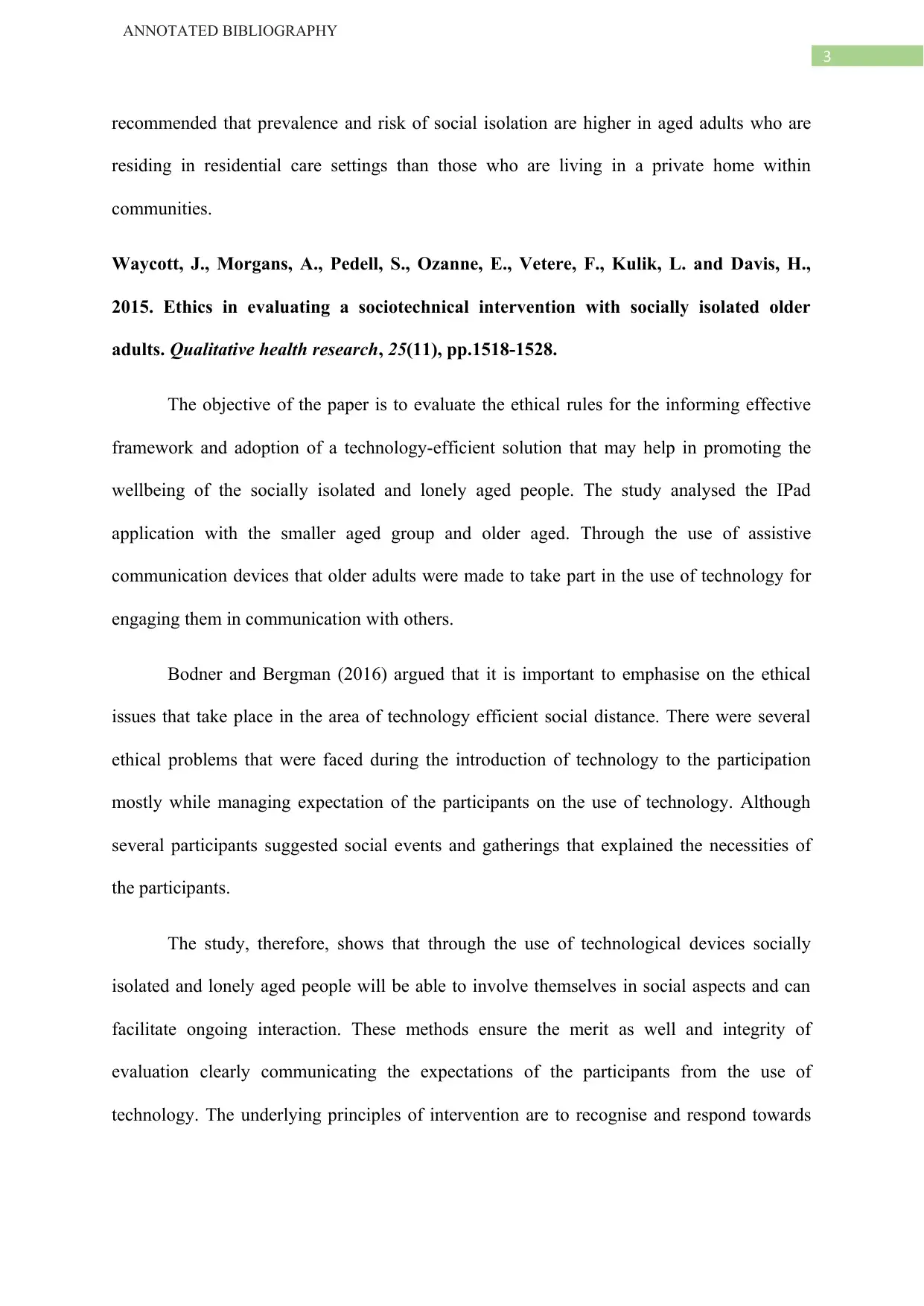
3
ANNOTATED BIBLIOGRAPHY
recommended that prevalence and risk of social isolation are higher in aged adults who are
residing in residential care settings than those who are living in a private home within
communities.
Waycott, J., Morgans, A., Pedell, S., Ozanne, E., Vetere, F., Kulik, L. and Davis, H.,
2015. Ethics in evaluating a sociotechnical intervention with socially isolated older
adults. Qualitative health research, 25(11), pp.1518-1528.
The objective of the paper is to evaluate the ethical rules for the informing effective
framework and adoption of a technology-efficient solution that may help in promoting the
wellbeing of the socially isolated and lonely aged people. The study analysed the IPad
application with the smaller aged group and older aged. Through the use of assistive
communication devices that older adults were made to take part in the use of technology for
engaging them in communication with others.
Bodner and Bergman (2016) argued that it is important to emphasise on the ethical
issues that take place in the area of technology efficient social distance. There were several
ethical problems that were faced during the introduction of technology to the participation
mostly while managing expectation of the participants on the use of technology. Although
several participants suggested social events and gatherings that explained the necessities of
the participants.
The study, therefore, shows that through the use of technological devices socially
isolated and lonely aged people will be able to involve themselves in social aspects and can
facilitate ongoing interaction. These methods ensure the merit as well and integrity of
evaluation clearly communicating the expectations of the participants from the use of
technology. The underlying principles of intervention are to recognise and respond towards
ANNOTATED BIBLIOGRAPHY
recommended that prevalence and risk of social isolation are higher in aged adults who are
residing in residential care settings than those who are living in a private home within
communities.
Waycott, J., Morgans, A., Pedell, S., Ozanne, E., Vetere, F., Kulik, L. and Davis, H.,
2015. Ethics in evaluating a sociotechnical intervention with socially isolated older
adults. Qualitative health research, 25(11), pp.1518-1528.
The objective of the paper is to evaluate the ethical rules for the informing effective
framework and adoption of a technology-efficient solution that may help in promoting the
wellbeing of the socially isolated and lonely aged people. The study analysed the IPad
application with the smaller aged group and older aged. Through the use of assistive
communication devices that older adults were made to take part in the use of technology for
engaging them in communication with others.
Bodner and Bergman (2016) argued that it is important to emphasise on the ethical
issues that take place in the area of technology efficient social distance. There were several
ethical problems that were faced during the introduction of technology to the participation
mostly while managing expectation of the participants on the use of technology. Although
several participants suggested social events and gatherings that explained the necessities of
the participants.
The study, therefore, shows that through the use of technological devices socially
isolated and lonely aged people will be able to involve themselves in social aspects and can
facilitate ongoing interaction. These methods ensure the merit as well and integrity of
evaluation clearly communicating the expectations of the participants from the use of
technology. The underlying principles of intervention are to recognise and respond towards
Paraphrase This Document
Need a fresh take? Get an instant paraphrase of this document with our AI Paraphraser
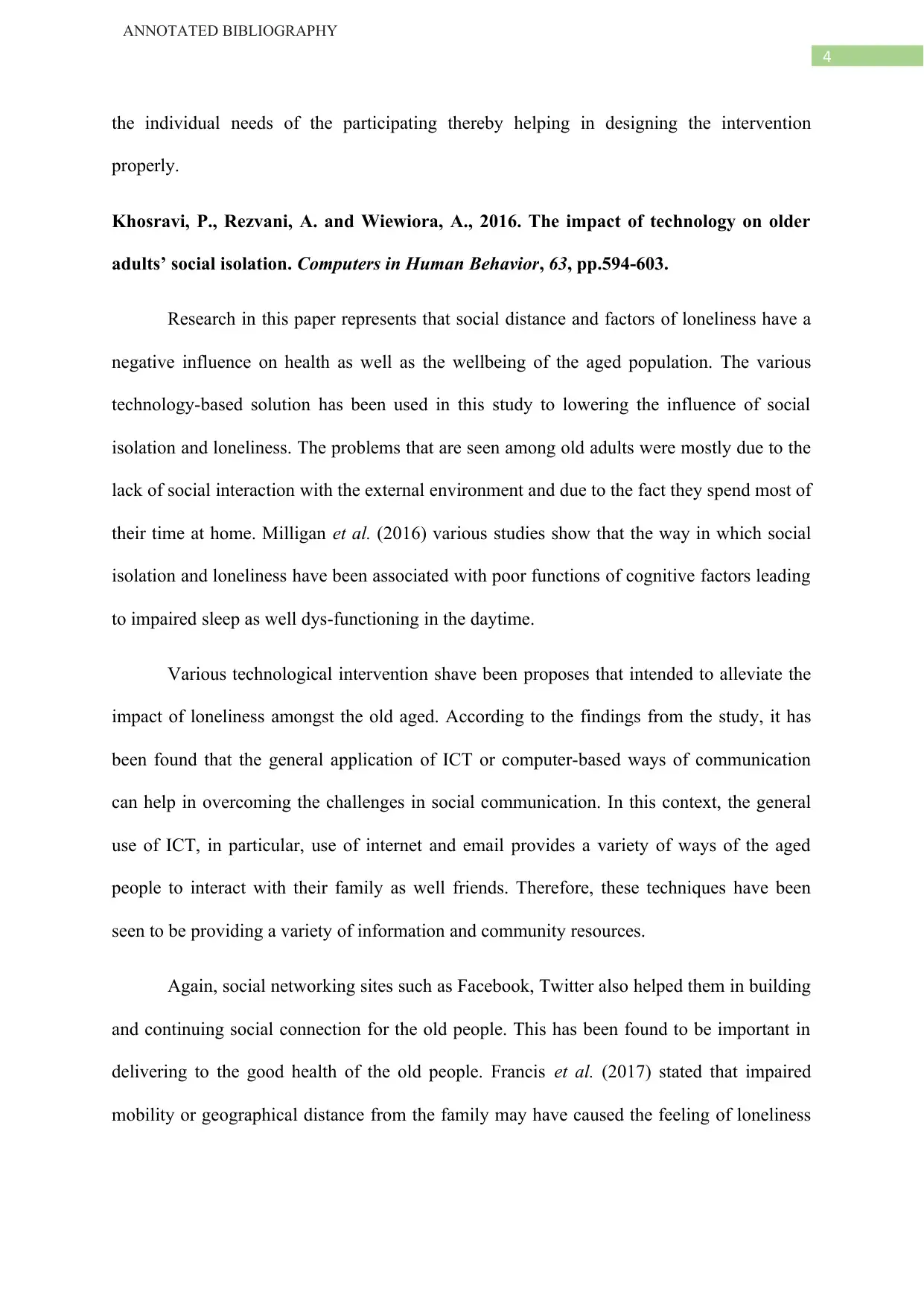
4
ANNOTATED BIBLIOGRAPHY
the individual needs of the participating thereby helping in designing the intervention
properly.
Khosravi, P., Rezvani, A. and Wiewiora, A., 2016. The impact of technology on older
adults’ social isolation. Computers in Human Behavior, 63, pp.594-603.
Research in this paper represents that social distance and factors of loneliness have a
negative influence on health as well as the wellbeing of the aged population. The various
technology-based solution has been used in this study to lowering the influence of social
isolation and loneliness. The problems that are seen among old adults were mostly due to the
lack of social interaction with the external environment and due to the fact they spend most of
their time at home. Milligan et al. (2016) various studies show that the way in which social
isolation and loneliness have been associated with poor functions of cognitive factors leading
to impaired sleep as well dys-functioning in the daytime.
Various technological intervention shave been proposes that intended to alleviate the
impact of loneliness amongst the old aged. According to the findings from the study, it has
been found that the general application of ICT or computer-based ways of communication
can help in overcoming the challenges in social communication. In this context, the general
use of ICT, in particular, use of internet and email provides a variety of ways of the aged
people to interact with their family as well friends. Therefore, these techniques have been
seen to be providing a variety of information and community resources.
Again, social networking sites such as Facebook, Twitter also helped them in building
and continuing social connection for the old people. This has been found to be important in
delivering to the good health of the old people. Francis et al. (2017) stated that impaired
mobility or geographical distance from the family may have caused the feeling of loneliness
ANNOTATED BIBLIOGRAPHY
the individual needs of the participating thereby helping in designing the intervention
properly.
Khosravi, P., Rezvani, A. and Wiewiora, A., 2016. The impact of technology on older
adults’ social isolation. Computers in Human Behavior, 63, pp.594-603.
Research in this paper represents that social distance and factors of loneliness have a
negative influence on health as well as the wellbeing of the aged population. The various
technology-based solution has been used in this study to lowering the influence of social
isolation and loneliness. The problems that are seen among old adults were mostly due to the
lack of social interaction with the external environment and due to the fact they spend most of
their time at home. Milligan et al. (2016) various studies show that the way in which social
isolation and loneliness have been associated with poor functions of cognitive factors leading
to impaired sleep as well dys-functioning in the daytime.
Various technological intervention shave been proposes that intended to alleviate the
impact of loneliness amongst the old aged. According to the findings from the study, it has
been found that the general application of ICT or computer-based ways of communication
can help in overcoming the challenges in social communication. In this context, the general
use of ICT, in particular, use of internet and email provides a variety of ways of the aged
people to interact with their family as well friends. Therefore, these techniques have been
seen to be providing a variety of information and community resources.
Again, social networking sites such as Facebook, Twitter also helped them in building
and continuing social connection for the old people. This has been found to be important in
delivering to the good health of the old people. Francis et al. (2017) stated that impaired
mobility or geographical distance from the family may have caused the feeling of loneliness

5
ANNOTATED BIBLIOGRAPHY
amongst the old aged, therefore SNS has the capability to overcome these challenges by
helping the older people to communicate with their family.
ANNOTATED BIBLIOGRAPHY
amongst the old aged, therefore SNS has the capability to overcome these challenges by
helping the older people to communicate with their family.
⊘ This is a preview!⊘
Do you want full access?
Subscribe today to unlock all pages.

Trusted by 1+ million students worldwide
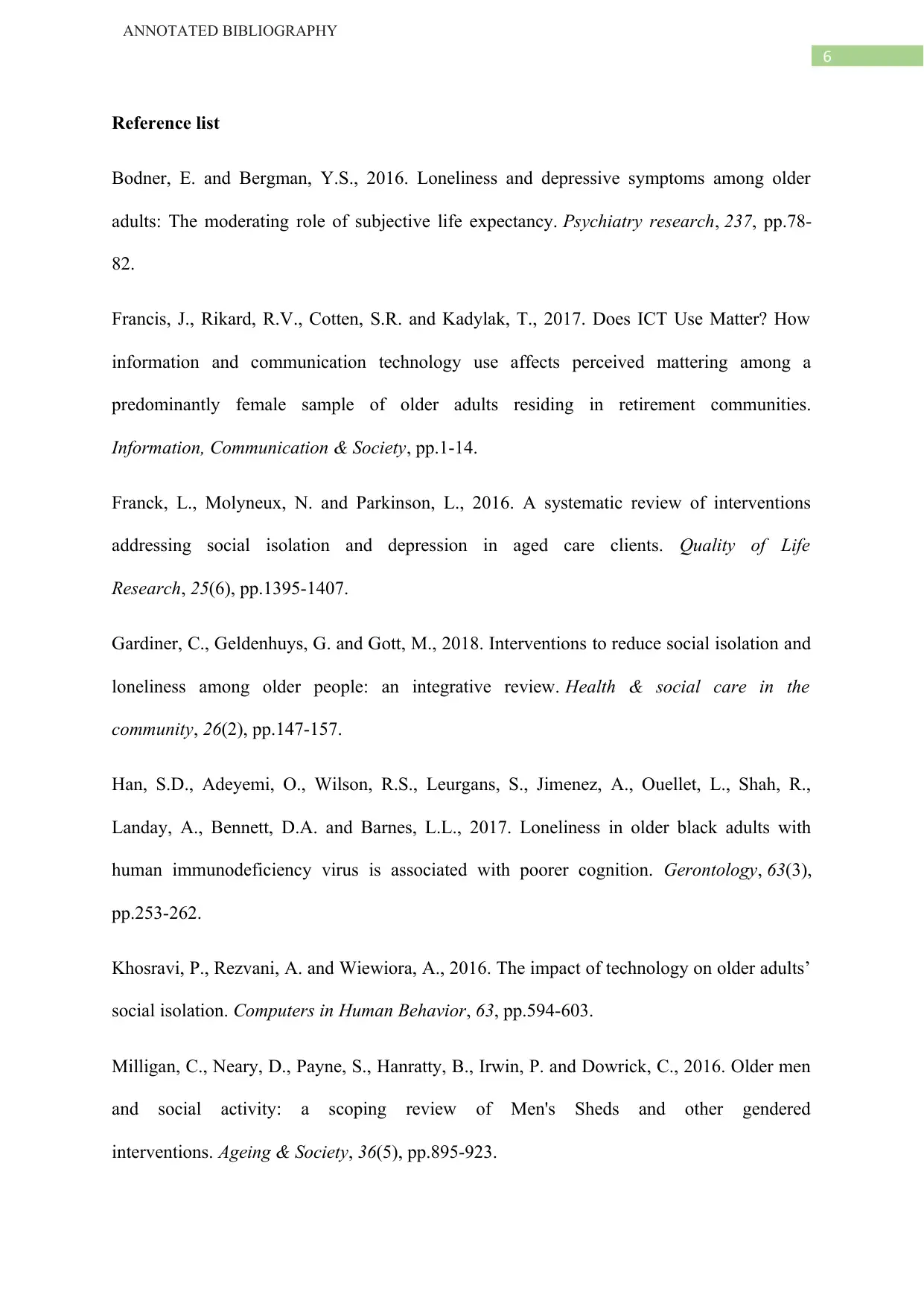
6
ANNOTATED BIBLIOGRAPHY
Reference list
Bodner, E. and Bergman, Y.S., 2016. Loneliness and depressive symptoms among older
adults: The moderating role of subjective life expectancy. Psychiatry research, 237, pp.78-
82.
Francis, J., Rikard, R.V., Cotten, S.R. and Kadylak, T., 2017. Does ICT Use Matter? How
information and communication technology use affects perceived mattering among a
predominantly female sample of older adults residing in retirement communities.
Information, Communication & Society, pp.1-14.
Franck, L., Molyneux, N. and Parkinson, L., 2016. A systematic review of interventions
addressing social isolation and depression in aged care clients. Quality of Life
Research, 25(6), pp.1395-1407.
Gardiner, C., Geldenhuys, G. and Gott, M., 2018. Interventions to reduce social isolation and
loneliness among older people: an integrative review. Health & social care in the
community, 26(2), pp.147-157.
Han, S.D., Adeyemi, O., Wilson, R.S., Leurgans, S., Jimenez, A., Ouellet, L., Shah, R.,
Landay, A., Bennett, D.A. and Barnes, L.L., 2017. Loneliness in older black adults with
human immunodeficiency virus is associated with poorer cognition. Gerontology, 63(3),
pp.253-262.
Khosravi, P., Rezvani, A. and Wiewiora, A., 2016. The impact of technology on older adults’
social isolation. Computers in Human Behavior, 63, pp.594-603.
Milligan, C., Neary, D., Payne, S., Hanratty, B., Irwin, P. and Dowrick, C., 2016. Older men
and social activity: a scoping review of Men's Sheds and other gendered
interventions. Ageing & Society, 36(5), pp.895-923.
ANNOTATED BIBLIOGRAPHY
Reference list
Bodner, E. and Bergman, Y.S., 2016. Loneliness and depressive symptoms among older
adults: The moderating role of subjective life expectancy. Psychiatry research, 237, pp.78-
82.
Francis, J., Rikard, R.V., Cotten, S.R. and Kadylak, T., 2017. Does ICT Use Matter? How
information and communication technology use affects perceived mattering among a
predominantly female sample of older adults residing in retirement communities.
Information, Communication & Society, pp.1-14.
Franck, L., Molyneux, N. and Parkinson, L., 2016. A systematic review of interventions
addressing social isolation and depression in aged care clients. Quality of Life
Research, 25(6), pp.1395-1407.
Gardiner, C., Geldenhuys, G. and Gott, M., 2018. Interventions to reduce social isolation and
loneliness among older people: an integrative review. Health & social care in the
community, 26(2), pp.147-157.
Han, S.D., Adeyemi, O., Wilson, R.S., Leurgans, S., Jimenez, A., Ouellet, L., Shah, R.,
Landay, A., Bennett, D.A. and Barnes, L.L., 2017. Loneliness in older black adults with
human immunodeficiency virus is associated with poorer cognition. Gerontology, 63(3),
pp.253-262.
Khosravi, P., Rezvani, A. and Wiewiora, A., 2016. The impact of technology on older adults’
social isolation. Computers in Human Behavior, 63, pp.594-603.
Milligan, C., Neary, D., Payne, S., Hanratty, B., Irwin, P. and Dowrick, C., 2016. Older men
and social activity: a scoping review of Men's Sheds and other gendered
interventions. Ageing & Society, 36(5), pp.895-923.
Paraphrase This Document
Need a fresh take? Get an instant paraphrase of this document with our AI Paraphraser

7
ANNOTATED BIBLIOGRAPHY
Waycott, J., Morgans, A., Pedell, S., Ozanne, E., Vetere, F., Kulik, L. and Davis, H., 2015.
Ethics in evaluating a sociotechnical intervention with socially isolated older
adults. Qualitative health research, 25(11), pp.1518-1528.
Wharton, J., Sugarhood, P., Procter, R. and Greenhalgh, T., 2015. Designing technologies for
social connection with older people. Ageing and the Digital Life Course, 3, pp.107-120.
ANNOTATED BIBLIOGRAPHY
Waycott, J., Morgans, A., Pedell, S., Ozanne, E., Vetere, F., Kulik, L. and Davis, H., 2015.
Ethics in evaluating a sociotechnical intervention with socially isolated older
adults. Qualitative health research, 25(11), pp.1518-1528.
Wharton, J., Sugarhood, P., Procter, R. and Greenhalgh, T., 2015. Designing technologies for
social connection with older people. Ageing and the Digital Life Course, 3, pp.107-120.
1 out of 8
Related Documents
Your All-in-One AI-Powered Toolkit for Academic Success.
+13062052269
info@desklib.com
Available 24*7 on WhatsApp / Email
![[object Object]](/_next/static/media/star-bottom.7253800d.svg)
Unlock your academic potential
Copyright © 2020–2026 A2Z Services. All Rights Reserved. Developed and managed by ZUCOL.





